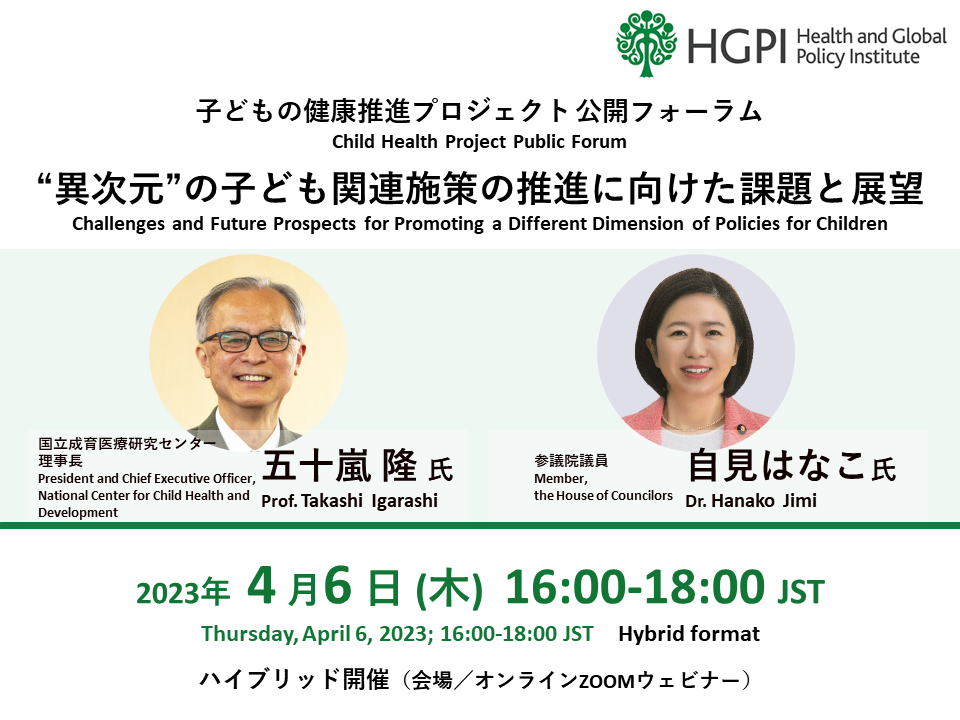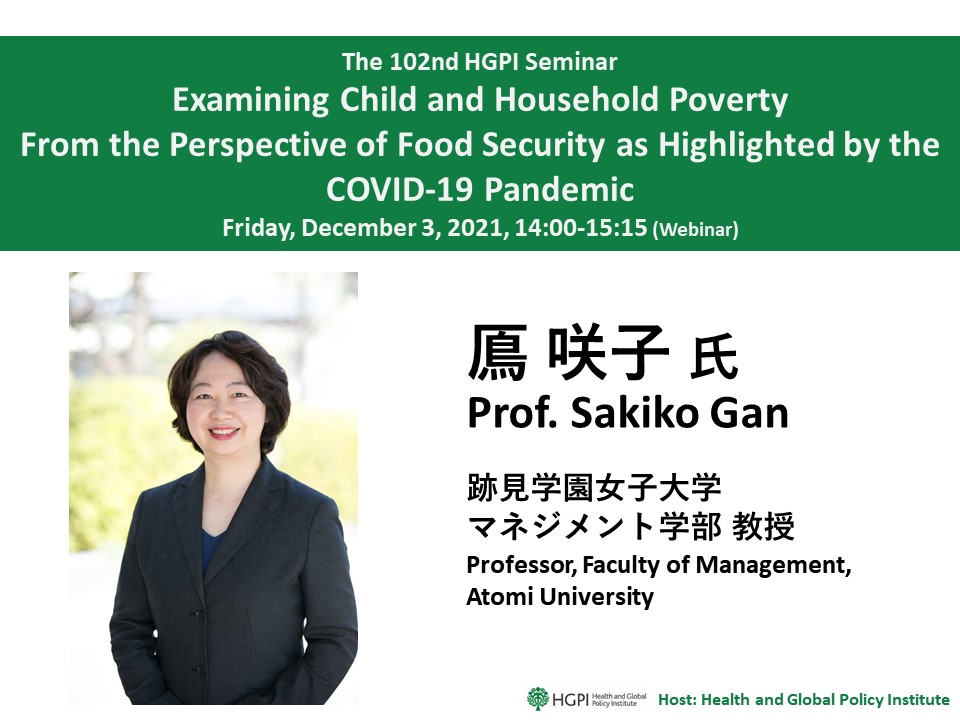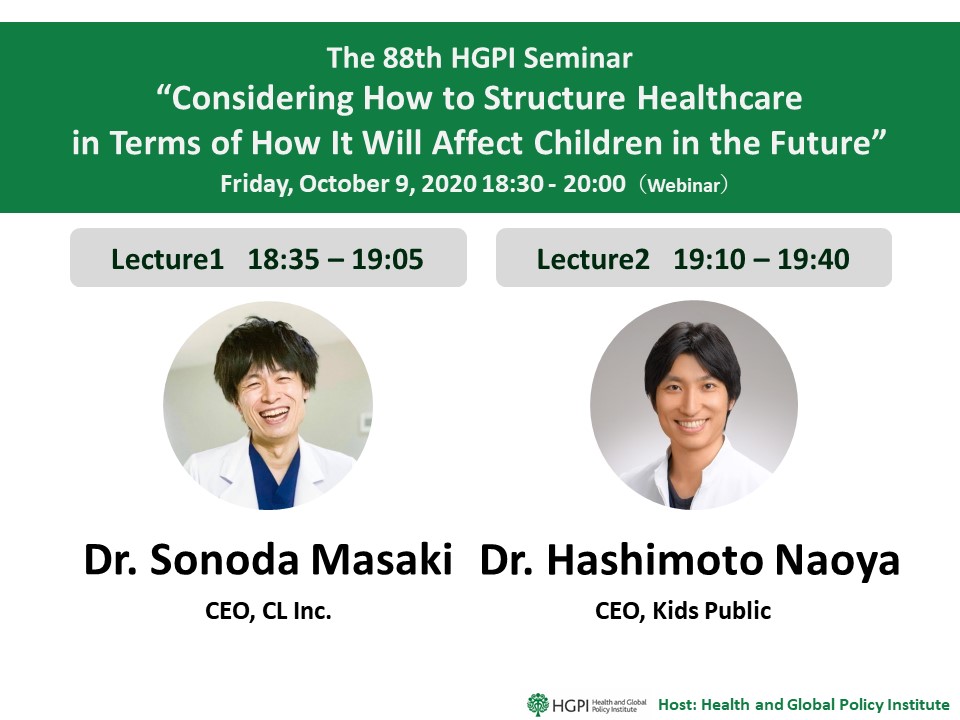[Urgent Recommendations] Challenges and Prospects for the Implementation and Execution of the Basic Law and Basic Policy for Child and Maternal Health and Development (February 17, 2023)
date : 3/10/2023
Tags: Child Health
![[Urgent Recommendations] Challenges and Prospects for the Implementation and Execution of the Basic Law and Basic Policy for Child and Maternal Health and Development (February 17, 2023)](https://hgpi.org/en/wp-content/uploads/sites/2/ch-20230217-top_ENG.png)
Health and Global Policy Institute (HGPI) has presented recommendations titled, “Urgent Recommendations: Challenges and Prospects for the Implementation and Execution of the Basic Law and Basic Plan for Child and Maternal Health and Development.”
In the face of ongoing demographic change driven by a declining birthrate and population aging, Japan must find successful methods of increasing the number of births while taking steps to provide seamless support for children that spans pregnancy to adulthood in order to offer children a safe and secure environment in which to grow. The Basic Law for Child and Maternal Health and Development was enacted in 2018 to help realize this objective by expanding support for children and child-rearing. Further action was taken in 2021, when the Cabinet approved the Basic Plan on Child and Maternal Health, Development, and Medical Care and set a direction for Government measures moving forward.
While the enactment of this Basic Law and Plan were groundbreaking developments, we have yet to see the conclusion of discussions aiming to produce specific measures for the national Government and local governments to implement as well as monitoring indicators for evaluating those measures, and it is desirable that steps are taken to crystallize issues and identify discussion points through multi-stakeholder action.
Based on hearings conducted with experts in a number of fields, the Health and Global Policy Institute (HGPI) Children’s Health Promotion Project has formulated the following urgent recommendations in hope of seeing them reflected in future initiatives from the national Government and local governments.
The recommendations include the following seven elements.
Recommendation 1: Broadly disseminate the foundational concepts of the Basic Law for Child and Maternal Health and Development in civil society and secure and maintain inclusivity and comprehensiveness, which are its vital elements.
Recommendation 2: Strengthen collaboration across ministries and local governments to ensure every policy introduced in Japan that is based on the Basic Law for Child and Maternal Health and Development is implemented in an equitable and effective manner.
Recommendation 3: Utilize public-private partnerships to evaluate and monitor policies related to children’s health from a biopsychosocial perspective and standardize indicators nationwide to make comparative evaluations possible.
Recommendation 4: Ensure the results of research related to children’s health can be rapidly implemented in society by building a research system, expanding financial support, and promoting government-academia collaboration on an ongoing basis.
Recommendation 5: Utilize tools that leverage digital health and other technologies to optimize the healthcare provision system while promoting cooperation among health services, welfare services, and the administration.
Recommendation 6: Build an integrated system that encompasses the public and private sectors and delivers seamless child-rearing support that reaches all family members.
Recommendation 7: Enhance areas where assistance and measures are insufficient through focused support that spans the perinatal period to school age.
Pain-free delivery, Postpartum care, Breastfeeding, Mass screenings for newborns, Abuse of children under one year of age, Medical examinations and checkups for psychological and social health, Utilizing screening programs for school age-children to provide early detection and treatment for familial diseases, Introduce comprehensive sex education and medical ethics education
For details, please see the PDF attached below.
“Child Health Project” advisory board (titles omitted, in Japanese syllabary order)
Kyoko Ama (Representative, Children and Healthcare Project; Fellow, HGPI)
Takashi Igarashi (President, National Center for Child Health and Development)
Fumio Endo (Professor Emeritus, Kumamoto University; General Director, Kumamoto-Ezuko Medical Center for the Severely Disabled)
Sonoko Sensaki (Assistant Director, Children’s Think Tank Planning and Coordination Office, National Center for Child Health and Development)
Kimitoshi Nakamura (Professor, Department of Pediatrics, Faculty of Life Sciences, Kumamoto University)
Akira Haneda (Director, Survey Research Center, Chiba Foundation for Health Promotion & Disease Prevention; Specially-Appointed Professor, Center for Preventive Medicinal Sciences, Chiba University)
Fumiki Hirahara (Director, Hospital Management Division, City of Yokohama; Professor Emeritus, Yokohama City University)
Sayaka Horiuchi (Assistant Professor, Department of Health Sciences, Division of Medicine, Graduate School Department of Interdisciplinary Research, University of Yamanashi)
Zentaro Yamagata (Professor, Department of Health Sciences, Division of Medicine, Graduate School Department of Interdisciplinary Research, University of Yamanashi)
Sponsors
Takeda Pharmaceutical Company Limited
Novartis Pharma K.K.
*Please note that these recommendations were compiled by independent health policy think-tank HGPI based on hearings with our advisory board. They should not be taken to represent the opinions of any specific advisory board member, any related party, or any organization to which those parties are affiliated. In addition, in accordance with HGPI’s “Guidelines on Grants and Contributions,” the direction and content of this project has been determined independently by HGPI regardless of the presence or intentions of sponsors.
Top Research & Recommendations Posts
- [Policy Recommendations] The Path to a Sustainable Healthcare System: Three Key Objectives for Public Deliberation (January 22, 2026)
- [Research Report] The 2025 Public Opinion Survey on Healthcare in Japan (March 17, 2025)
- [Research Report] Perceptions, Knowledge, Actions and Perspectives of Healthcare Organizations in Japan in Relation to Climate Change and Health: A Cross-Sectional Study (November 13, 2025)
- [Policy Recommendations] Reshaping Japan’s Immunization Policy for Life Course Coverage and Vaccine Equity: Challenges and Prospects for an Era of Prevention and Health Promotion (April 25, 2025)
- [Research Report] The 2023 Public Opinion Survey on Satisfaction in Healthcare in Japan and Healthcare Applications of Generative AI (January 11, 2024)
- [Policy Recommendations] Developing a National Health and Climate Strategy for Japan (June 26, 2024)
- [Public Comment Submission] “Assessment Report on Climate Change Impacts in Japan (Draft Overview)” (December 24, 2025)
- [Policy Recommendations] Achieving Equity in Multidisciplinary Pain Treatment and Support Systems for Pain Management (March 31, 2023)
- [Research Report] Survey of Japanese Physicians Regarding Climate Change and Health (December 3, 2023)
- [Research Report] The Public Opinion Survey on Child-Rearing in Modern Japan (Final Report) (March 4, 2022)
Featured Posts
-
2026-01-09
[Registration Open] (Hybrid Format) Dementia Project FY2025 Initiative Concluding Symposium “The Future of Dementia Policy Surrounding Families and Others Who Care for People with Dementia” (March 9, 2026)
![[Registration Open] (Hybrid Format) Dementia Project FY2025 Initiative Concluding Symposium “The Future of Dementia Policy Surrounding Families and Others Who Care for People with Dementia” (March 9, 2026)](https://hgpi.org/en/wp-content/uploads/sites/2/dementia-20260309-top.png)
-
2026-02-05
[Registration Open] (Webinar) The 141st HGPI Seminar “Current Status and Future Prospects of Korea’s Obesity Policy: Voices of People with Lived Experience in Policy Promotion” (March 3, 2026)
![[Registration Open] (Webinar) The 141st HGPI Seminar “Current Status and Future Prospects of Korea’s Obesity Policy: Voices of People with Lived Experience in Policy Promotion” (March 3, 2026)](https://hgpi.org/en/wp-content/uploads/sites/2/hs141-top-1.png)
-
2026-02-06
[Research Report] AMR Policy Update #5: Cancer Care and AMR (Part 2)
![[Research Report] AMR Policy Update #5: Cancer Care and AMR (Part 2)](https://hgpi.org/en/wp-content/uploads/sites/2/HGPI_20260204_AMR-Policy-Update-5.png)







